Key takeaways:
- Assessments in workshops enhance participant engagement, foster dialogue, and build a community of learners.
- Utilizing various assessment methods, such as peer reviews and self-assessments, promotes active participation and personal growth.
- Feedback from assessments provides valuable insights into the effectiveness of events and guides future improvements.
- Interactive tools and techniques, such as role-playing and digital platforms, can significantly enhance the assessment experience.
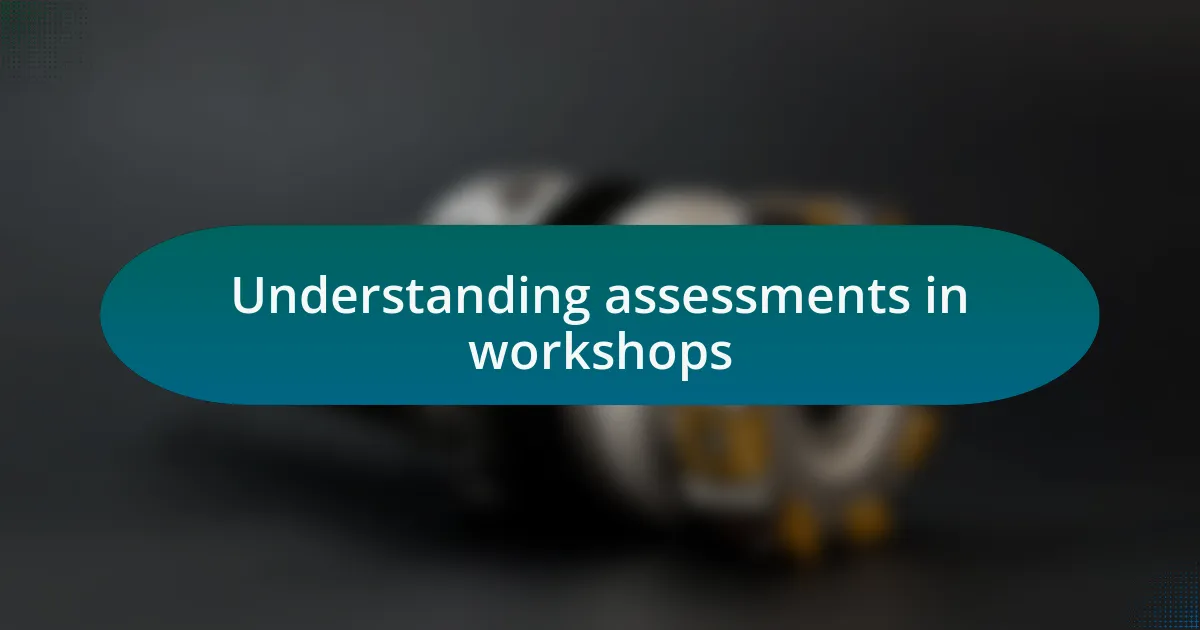
Understanding assessments in workshops
Assessments in workshops serve as pivotal tools that allow facilitators to gauge understanding and adapt their teaching methods in real time. I often think about a workshop I conducted on emerging technologies where I used quick polls to assess participant knowledge. This immediate feedback not only kept everyone engaged but also illuminated areas that needed more focus.
When I first experimented with assessments, I was surprised by how much they fostered a deeper connection among participants. One memorable instance involved using group discussions as a form of assessment, where participants collaboratively tackled a real-world problem. It was striking to see how diverse perspectives enriched the conversation, creating a dynamic learning atmosphere that assessments facilitated.
It makes me ponder: how can we truly know if our training resonates without some form of assessment? In my experience, assessments do more than measure; they invite dialogue and build a community of learners eager to share insights and experiences. There’s an undeniable energy that assessments bring, transforming a workshop from a simple lecture into an interactive journey.
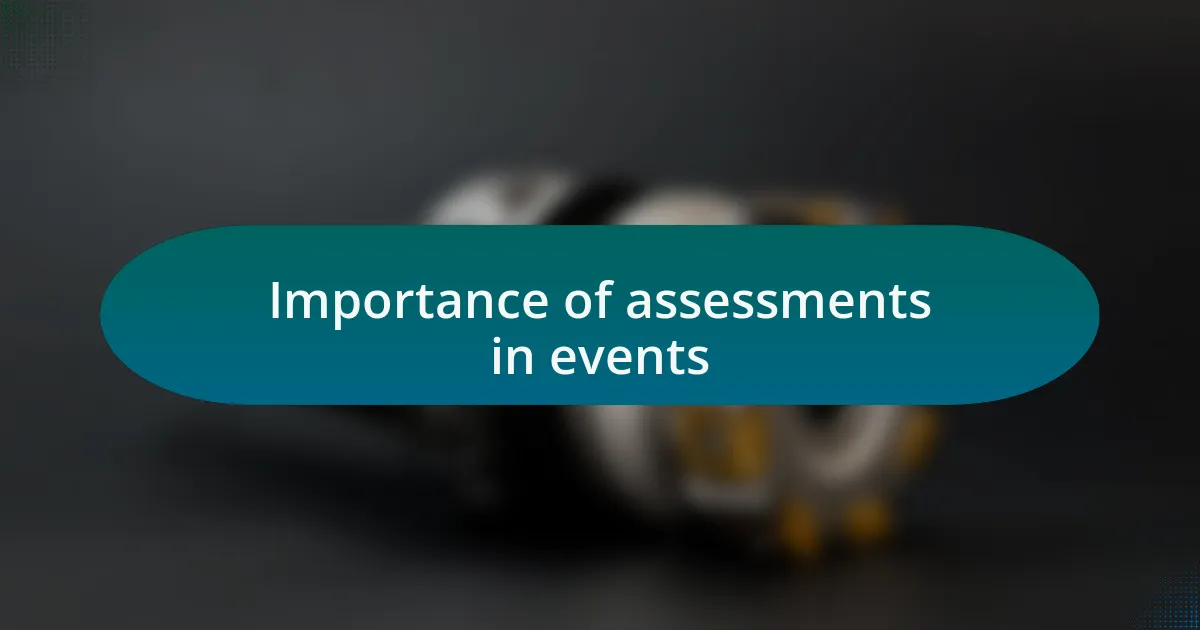
Importance of assessments in events
Assessments play a critical role in events by not only measuring participants’ learning but also enhancing the overall experience. I recall a tech seminar where we implemented scenario-based quizzes. The excitement in the room was palpable as attendees worked together to solve these challenges, revealing their knowledge gaps and sparking conversations that enriched the session. Isn’t it fascinating how assessments can ignite a deeper level of interaction?
Moreover, I’ve learned that assessments provide invaluable insights into the effectiveness of the event itself. After a workshop on digital marketing strategies, I handed out feedback forms to gauge participants’ takeaways. Seeing their responses helped me identify what worked and what didn’t, allowing me to refine my approach for future sessions. How can we improve our craft without this feedback loop?
Ultimately, incorporating assessments fosters a culture of continuous learning. I often find that when participants feel their understanding is valued through various assessment methods, they’re more likely to invest in the learning process. It’s a simple yet profound shift – assessments turn passive attendees into active participants, transforming their overall experience while ensuring they gain meaningful skills.
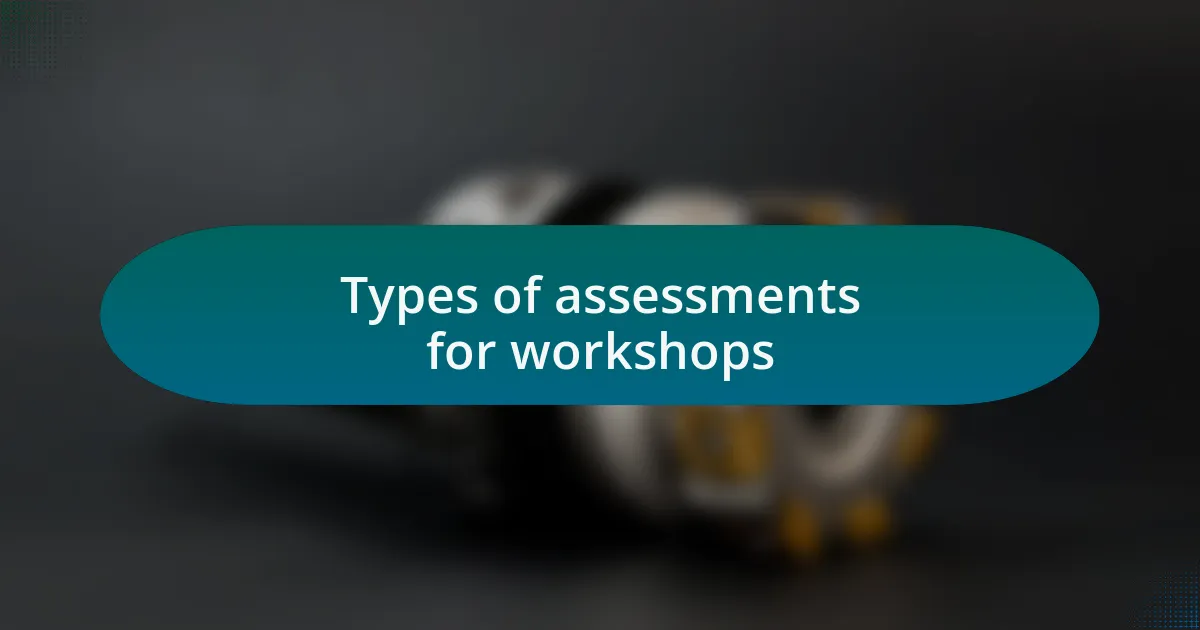
Types of assessments for workshops
When it comes to assessments in workshops, I often lean towards informal quizzes and polls. I remember a particularly engaging workshop on coding languages where I used real-time polling tools. As I posed questions, participants actively participated, and their immediate feedback shaped our discussion. It created this dynamic atmosphere where everyone’s voice was heard. Have you ever noticed how such interactive elements can lighten the mood while reinforcing learning?
Another approach I find incredibly effective is peer assessments. In a recent workshop focused on project management, I had participants review each other’s work in small groups. The collaborative spirit was infectious. It was heartening to see attendees provide constructive feedback, as they learned just as much from critiquing others as they did from the original content. Isn’t it amazing how learning can happen in unexpected ways?
Finally, I can’t overlook the value of self-assessment tools. After a session on leadership techniques, I encouraged attendees to reflect on their strengths and areas for growth through guided self-assessment exercises. The personal breakthroughs I witnessed were genuinely moving. It reminded me how powerful it is to give participants the space to evaluate their own learning journeys. Don’t you think that self-reflection is often the first step toward meaningful change?
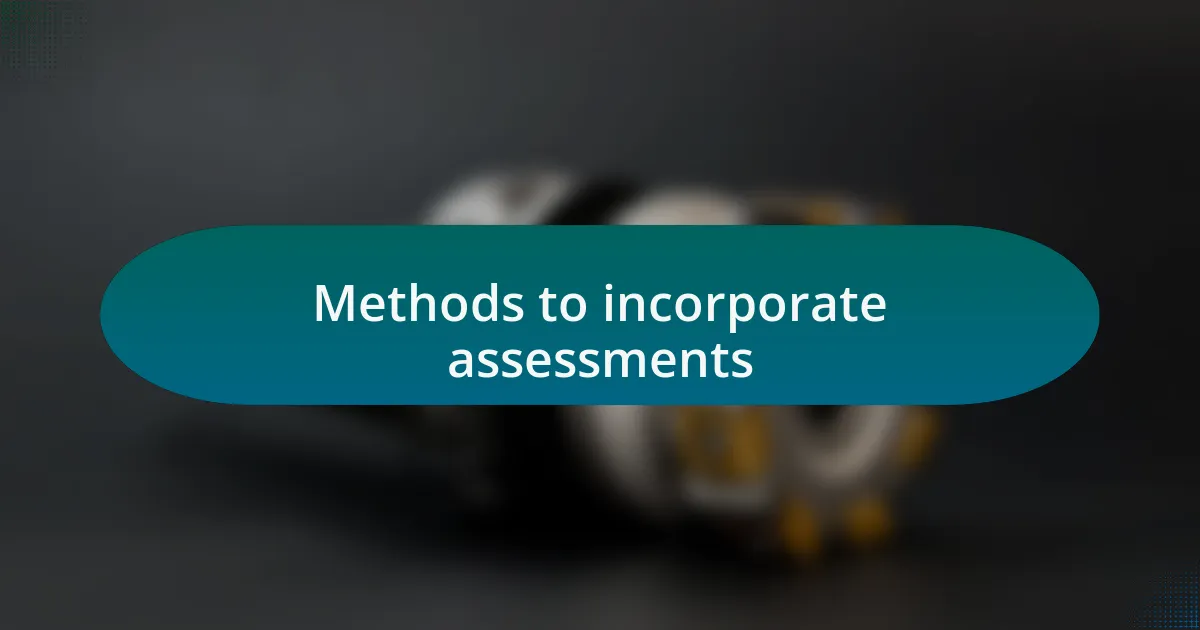
Methods to incorporate assessments
One method I’ve found to effectively incorporate assessments is through the use of role-playing scenarios. For instance, during a recent workshop on user experience design, I randomly assigned attendees different perspectives, such as developers and users. The energy in the room shifted immediately as they acted out real-life scenarios. It was fascinating to see participants gain insights not only about their roles but also about the challenges others face. Have you ever participated in an exercise that turned theory into practice in such a vivid way?
Another approach I frequently utilize involves exit tickets. After a workshop on cybersecurity, I asked participants to jot down one key takeaway and one question they still had before leaving. This simple technique not only offered me a glimpse into their thinking but also sparked many insightful follow-up conversations via email. It’s striking how a small request can leave a lasting impact, right?
I also believe in the power of reflection journals. After a comprehensive session on digital marketing strategies, I encouraged attendees to keep a journal for a week, documenting how they planned to implement what they learned. Seeing their personal insights unfold over time, filled with excitement, hope, and some uncertainty, was incredibly rewarding. Don’t you just love witnessing growth as it happens, even in the most subtle ways?
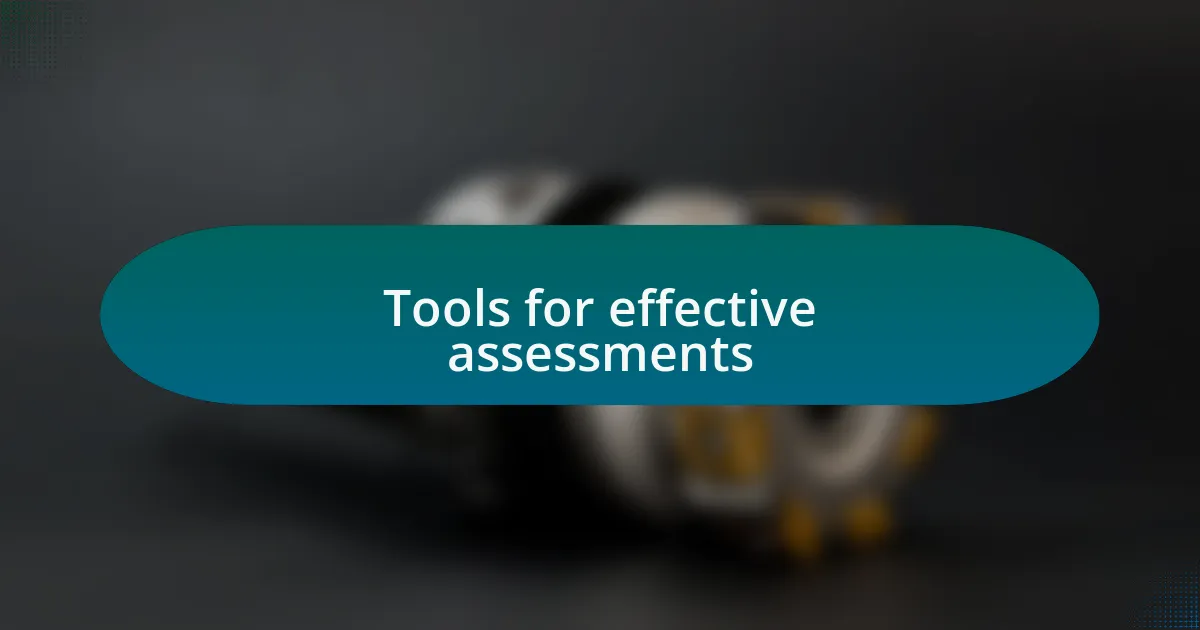
Tools for effective assessments
When it comes to tools for effective assessments, I’ve found that interactive quizzes can work wonders. In a workshop about data analytics, I introduced a quiz halfway through the session. Participants were surprised to discover how much they absorbed. It created an atmosphere of friendly competition that kept everyone engaged and alert. Have you ever noticed how a little gamification can energize a group?
Another essential tool I often use is peer review. During a recent coding boot camp, I assigned pairs to critique each other’s projects. The dynamic was powerful as they exchanged constructive feedback. I remember one participant telling me that hearing a peer’s perspective opened their eyes to new possibilities. Isn’t it amazing how collaboration can enhance understanding and foster camaraderie?
Lastly, I genuinely value using digital assessment platforms like Kahoot or Google Forms. In a workshop on mobile app development, I utilized these tools to gather real-time feedback. It allowed me to adjust my content on the fly based on participants’ reactions. The results were immediate and enlightening. Can you imagine the benefits of adapting your approach instantly?
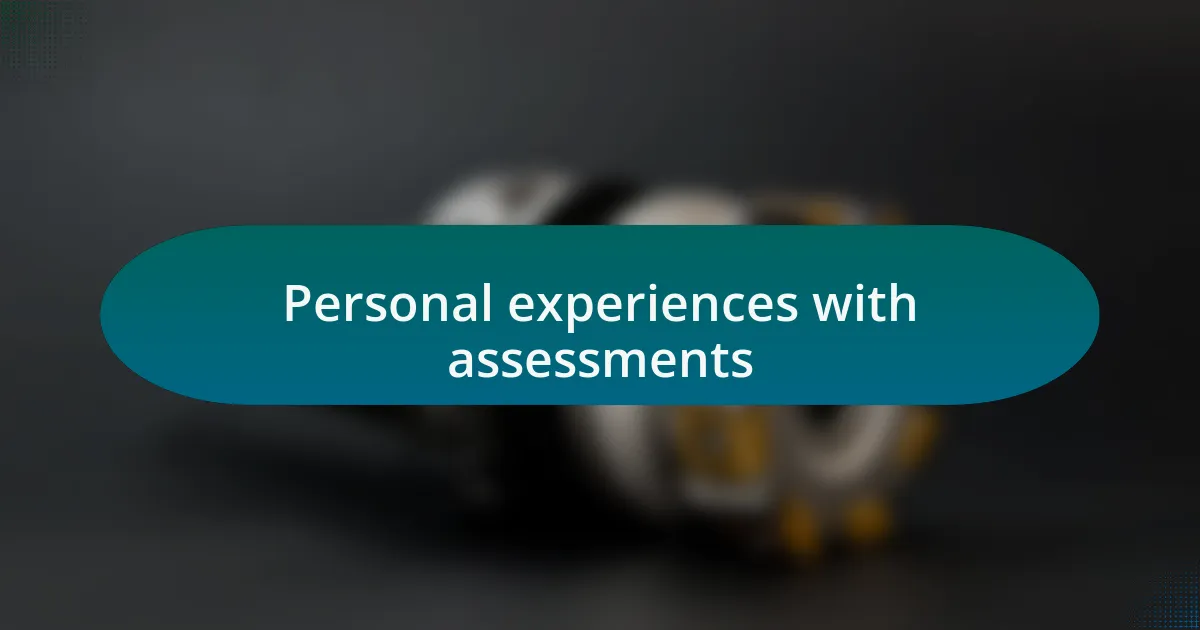
Personal experiences with assessments
In my experience, assessments can act as powerful learning moments. I recall a workshop on cybersecurity where I handed out a scenario-based quiz. The moment the participants began discussing their answers, I noticed a spark of excitement. They weren’t just guessing; they were sharing concepts and strategies, elevating their understanding together. Have you ever felt that kind of collective learning energy in a room?
One unforgettable moment came during a workshop focused on machine learning. I incorporated a live coding challenge, and I could see some participants struggling while others soared. Rather than simply providing the answers, I encouraged them to discuss their thought processes. The discussions turned into a mini-mentorship, and several attendees left with newfound confidence. Isn’t it incredible how assessments can be transformative rather than just evaluative?
There was a time when I hesitated to introduce assessments, fearing it might disrupt the creative flow of a design thinking session. However, I decided to incorporate a reflective exercise midway through, asking participants to jot down their insights. The shift in energy was remarkable. They became more mindful of their learning journey, and I realized that assessments, even when unexpected, can provide clarity. Have you ever discovered that a simple reflection could change your perspective?